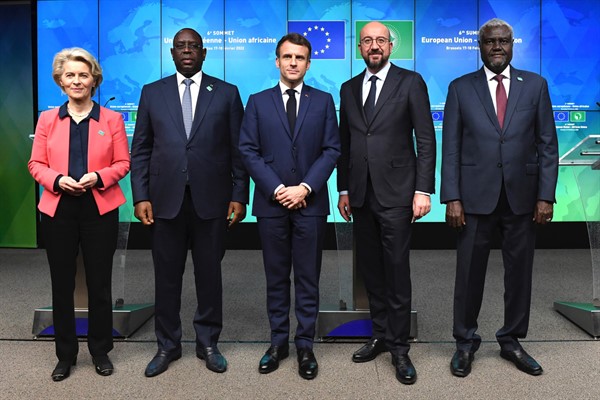African leaders have assembled in Brussels, Belgium, this week to meet with their European counterparts for the sixth edition of the African Union-European Union summit. The two-day gathering, which kicked off yesterday, is taking place against the backdrop of deepening tensions between Africa and Europe, in large part due to Europe’s responses to the coronavirus pandemic, including the EU’s discriminatory travel bans slapped on South Africa and its neighbors after the initial identification by South African researchers of the omicron variant, as well as what several African Union leaders have referred to as “vaccine apartheid.”
The summit also comes as established and rising global powers increasingly reckon with Africa’s geopolitical importance. Visits to the continent in 2021 by U.S. Secretary of State Antony Blinken and Turkish President Recep Tayyip Erdogan capped a year that also saw a rebooted edition of the Franco-Africa Summit, the Eighth Forum on China-Africa Cooperation, or FOCAC, and the Third Turkey-Africa Partnership Summit. Earlier this year, Chinese Foreign Minister Wang Yi followed up on FOCAC with a visit to East Africa, where he announced Beijing’s intention to appoint a special envoy for the Horn of Africa. Japan, Russia and the U.S. have also announced plans for summits with the continent’s leaders to be held this year, although dates have yet to be determined.
It is in the context of this growing competition for African hearts and minds that the EU late last year launched “Global Gateway,” a 300 billion euro infrastructure investment package, widely regarded as a rival to China’s Belt and Road Initiative, though EU officials insist otherwise. For EU leaders, including European Council President Charles Michel and particularly von der Leyen, Global Gateway is illustrative of the kind of “geopolitical commission” von der Leyen argues the EU needs. As such, senior EU officials, bloc leaders and European commentators have enthusiastically greeted the initiative’s rollout with much fanfare, touting the 150 billion euros in investment funds reportedly earmarked for African countries. In public briefings as well as my own private discussions with analysts of Africa-EU relations and EU officials, particularly Africa-based ones, there is broadly shared enthusiasm for what they regard as a major European deliverable amid competition from Beijing and Washington.

